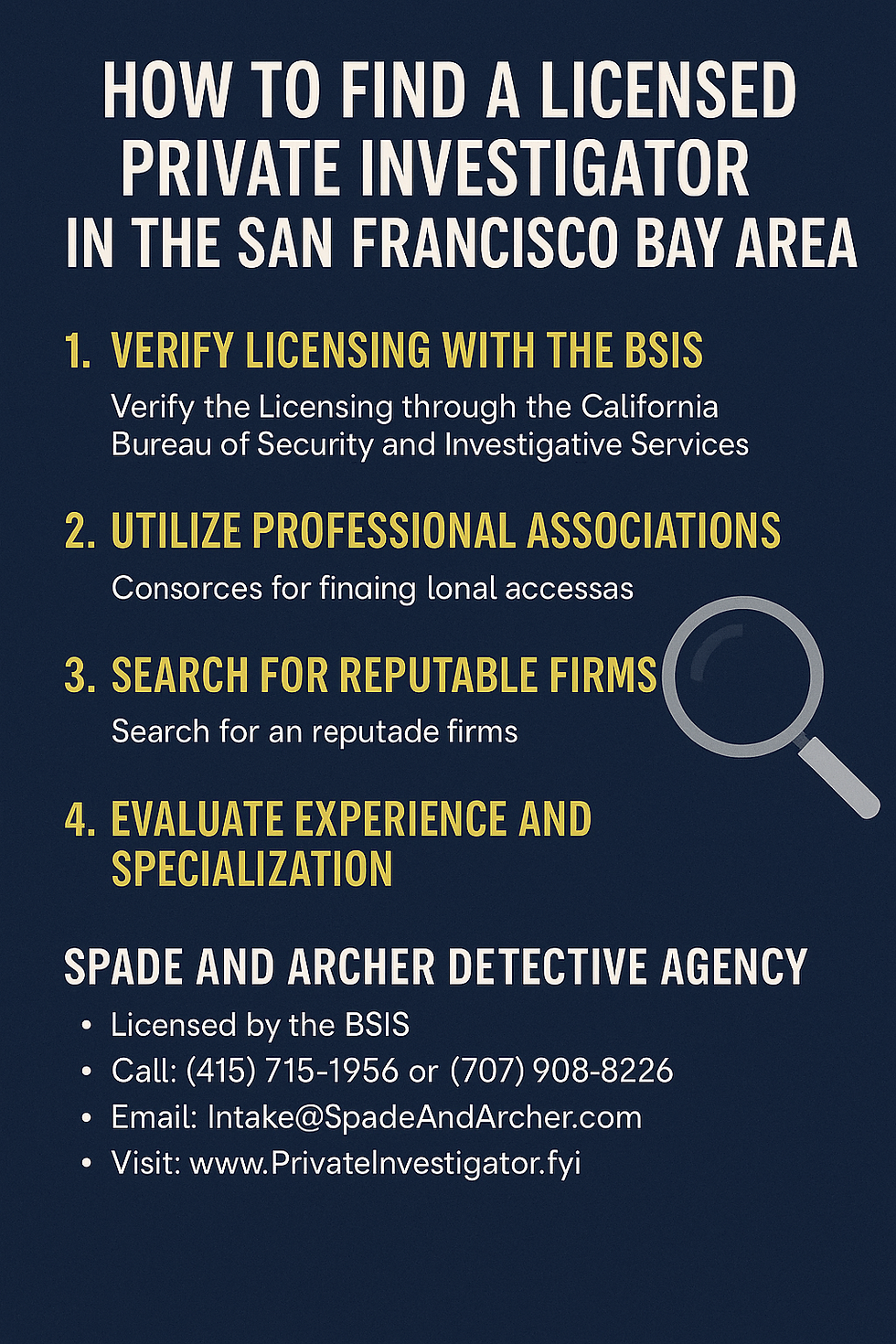Can a CPA Conduct Investigations Without a PI License?
- Sam Spade

- Jul 30
- 5 min read
In an era where white-collar crime, asset concealment, and corporate fraud are increasingly sophisticated, Certified Public Accountants (CPAs) are often drawn into matters that require more than traditional financial scrutiny. Many CPAs have added credentials in forensic accounting or fraud examination. However, in states where private investigator licensing is mandated, the question must be asked: When does a CPA's work cross the line into the realm of private investigation, requiring a state-issued PI license?
This is not just a theoretical issue. The legal, ethical, and evidentiary implications are significant. If a CPA engages in work considered investigative under the law without holding a PI license, they risk criminal penalties, disciplinary action, and the potential inadmissibility of their work product in court.

Regulatory Foundation: The PI Licensing Requirement in Investigative States
Most states in the U.S. regulate the practice of private investigation through a formal licensing process. In states like California, Texas, New York, Florida, and Illinois, the practice of investigating individuals, businesses, or events on behalf of another party requires licensure.
In California, for instance, the Business and Professions Code §7521 defines a private investigator as anyone who, for compensation, engages in business or accepts employment to conduct investigations for the purpose of obtaining information on the identity, conduct, habits, movements, whereabouts, affiliations, reputation, or character of any person. This definition is intentionally broad and has been interpreted to include various forms of civil, legal, and financial inquiries.
The inclusion of language such as "for the purpose of obtaining information" and "on behalf of another" is critical. This means that even if the information is publicly available, if the CPA is hired to collect, analyze, and report it as part of a litigation or dispute, the activity may be considered investigative in nature.
What CPAs Are Generally Permitted to Do
CPAs are licensed professionals governed by state boards of accountancy. They are authorized to perform the following tasks within the scope of their licensure and expertise:
Financial Audits: Performing audits of company financials under generally accepted auditing standards (GAAS).
Internal Controls Analysis: Assessing risk management, compliance systems, and accounting controls.
Tax Preparation and Planning: Filing returns, analyzing tax exposure, and representing clients before the IRS.
Forensic Accounting: Tracing financial transactions, identifying misappropriation of funds, and quantifying damages.
Litigation Support (Financial Only): Providing financial analysis in legal cases under the supervision of counsel.
Expert Witness Testimony: Offering opinions on accounting standards, damages calculations, and valuation.
Business Valuation: Assessing enterprise value for tax, divorce, or merger-related contexts.
Bankruptcy Analysis: Evaluating insolvency, payment priorities, and preferential transfers.
Internal Fraud Detection: Uncovering anomalies in financial records that suggest employee misconduct.
Client Interviews Related to Financial Issues: Discussing financial records or procedures with employees or management.
These activities are grounded in the CPA's core competency: the analysis of financial records. Problems arise when the focus shifts from financial analysis to behavioral, reputational, or legal fact-finding regarding a person or business.
What CPAs May Not Legally Do Without a PI License in a Regulated State
Locate or Track Individuals: Attempting to find a person's whereabouts or verify residency for legal proceedings.
Perform Surveillance: Using any method (including digital) to observe or document a person's movements or conduct.
Conduct Background Investigations: Researching personal history, associations, criminal records, or civil filings outside a financial audit context.
Interview Witnesses for Fact-Finding: Contacting individuals to collect testimony or statements for litigation, unless working directly under counsel.
Conduct OSINT Profiling: Performing open-source intelligence collection on individuals or entities for reputational or litigation purposes.
Investigate Spousal Misconduct or Hidden Assets Independently: In divorce or trust disputes, searching for concealed property or financial misrepresentation without attorney oversight or a PI license.
Asset Tracing Beyond Accounting Records: Attempting to locate offshore holdings, real estate, or other assets that are not part of known financial documents.
Social Media Monitoring for Adverse Conduct: Tracking an individual's online presence for behavior unrelated to financial reporting.
Interviewing or Investigating Adverse Parties: Engaging directly with parties in a dispute for purposes other than financial discovery.
Collecting Evidence for Admissibility in Court Without Legal Supervision: Submitting investigative material outside the CPA’s expertise without being part of a legal team.
Professional and Legal Implications
The consequences of crossing the line into unauthorized investigative activity are not theoretical. In many states, including California, unlicensed investigative activity is a misdemeanor offense. More importantly for CPAs, such conduct can lead to:
Exclusion of Evidence: Courts may refuse to admit work product that was gathered unlawfully.
Disciplinary Action: State boards of accountancy may impose sanctions, suspensions, or revocations for unethical conduct.
Civil Liability: CPAs could be sued by subjects of their investigations for invasion of privacy, defamation, or improper disclosure.
Professional Reputation Damage: A CPA's credibility as an expert witness may be compromised if it is discovered they operated outside their legal authority.
Why the Line Exists: Purpose and Policy
The requirement for PI licensure is not bureaucratic red tape; it serves a distinct public policy purpose. Private investigators must undergo background checks, training, and state-level vetting because their work often involves sensitive personal information, surveillance, and conduct that, in other contexts, could violate privacy laws.
CPAs, although highly trained and regulated, are not evaluated for their ability to ethically and legally manage investigations involving non-financial personal data. The line exists to protect individuals from unwarranted or unethical intrusion, to ensure legal accountability, and to maintain the evidentiary integrity of investigations that may end up in court.
Best Practices for CPAs Who Encounter Investigative Scenarios
Partner With a Licensed PI Firm: When a matter requires background research, asset tracing, or surveillance, collaborate with a properly credentialed investigator.
Operate Under Attorney Supervision: When part of a legal team, make sure all investigative work is directed and supervised by counsel.
Stay Within Financial Boundaries: Focus on what can be proven through ledgers, tax returns, bank statements, and financial reports.
Document Scope Carefully: Define and limit the scope of services in engagement letters to avoid ambiguity.
Maintain Professional Objectivity: Avoid advocacy roles in legal disputes that might compromise your independence.
Final Thoughts
The intersection of forensic accounting and private investigation is becoming increasingly common in today's litigation and regulatory environment. However, professionals must respect the legal boundaries between disciplines. CPAs bring powerful expertise to the table, but when investigations move beyond the numbers and into the behavioral or legal realm, a licensed private investigator must take the lead.
For investigative matters in California and throughout the Bay Area, Spade & Archer® provides licensed, court-compliant investigative services that seamlessly complement the financial expertise of CPAs, attorneys, and litigation teams.
Contact Spade & Archer®
(707) 908-8226 | (415) 715-1956




Comments